Israel's prime minister said a potential ceasefire in its war against Hamas militants would only delay a ground invasion of Gaza's southern city Rafah that is sheltering more than half of the territory's population.
The United States said ongoing mediation efforts produced "an understanding" towards a ceasefire and hostage release, while dire food shortages in northern Gaza have sent Palestinians fleeing.
Egyptian, Qatari and US experts met in Doha for talks also attended by Israeli and Hamas representatives, state-linked Egyptian media said, in the latest effort to secure a truce before the Muslim holy month of Ramadan.
Amid a spiralling humanitarian crisis, the main UN aid agency for Palestinians urged political action to avert famine in Gaza.
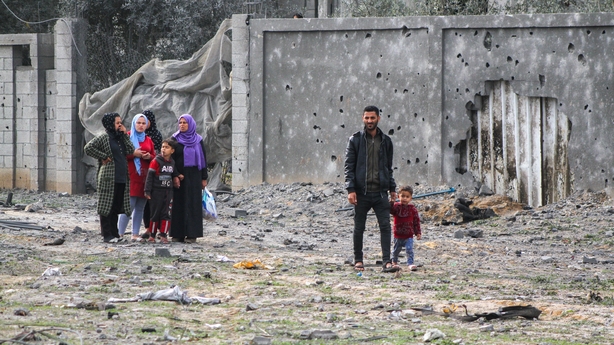
Israeli Prime Minister Benjamin Netanyahu said that the military operation into Rafah would put Israel within weeks of "total victory" over Hamas whose 7 October attack triggered the war.
"If we have a deal, it will be delayed somewhat, but it will happen," he told CBS of the looming ground invasion feared to bring more mass civilian casualties in Rafah, where around 1.4 million Palestinians - most of them displaced from other areas - are sheltering.
"If we don't have a deal, we'll do it anyway," Mr Netanyahu said.
"It has to be done because total victory is our goal and total victory is within reach - not months away, weeks away, once we begin the operation."
Dire food shortages in northern Gaza which have sent Palestinians fleeing south were "a man-made disaster" that can be mitigated, said Philippe Lazzarini, head of the UN agency for Palestinian refugees, UNRWA.
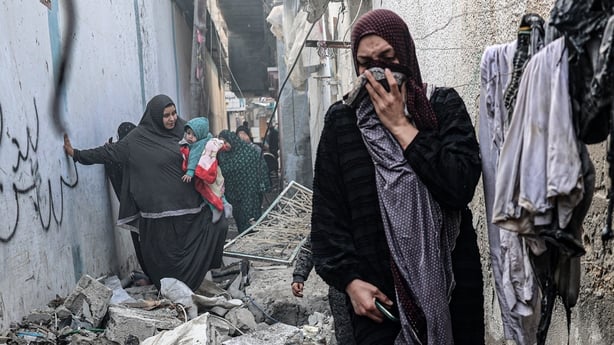
"Famine can still be avoided through genuine political will to grant access and protection to meaningful assistance."
The UN has said it faces restrictions, particularly on aid deliveries to northern Gaza.
The Doha talks follow a weekend meeting in Paris, without Hamas, where representatives "came to an understanding among the four of them about what the basic contours of a hostage deal for temporary ceasefire would look like", White House National Security Advisor Jake Sullivan told CNN.
More than four months into the war, desperate families in the north of besieged Gaza have been forced to scavenge for food as fighting and looting have stopped humanitarian deliveries.
'Uninhabitable'
Hundreds headed south whichever way they could, walking down rubbish-strewn roads between the blackened shells of bombed-out buildings, according to an AFP correspondent.
"I came on foot from north Gaza," said Samir Abd Rabbo, 27, who arrived with his one-year-old daughter at the Nuseirat camp in central Gaza.
Without milk, he said, he had tried to feed his baby girl bread made from animal feed, which she was unable to digest. "Our only hope is God, there is nobody else to help."
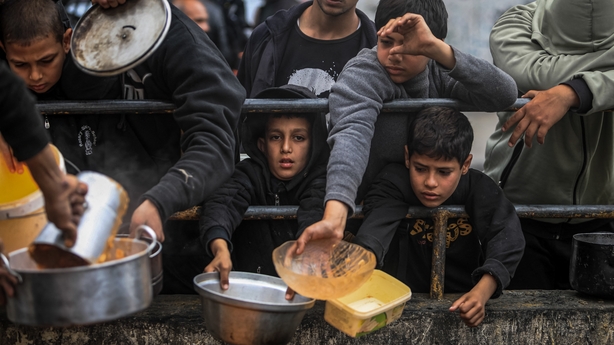
In northern Gaza's Jabalia refugee camp, displaced man Marwan Awadieh said the area "has become completely uninhabitable" and food was desperately scarce.
"Even the animal fodder that we had resorted to is now unavailable," he said, and wild herbs have "now been depleted, people have gathered it all".
Israeli forces continued striking targets across the Palestinian territory and battling Hamas militants in heavy urban combat centred on the southern city of Khan Younis, near Rafah.
The war broke out after Hamas' attack which resulted in the deaths of about 1,160 people in Israel, mostly civilians, according to an AFP tally of official figures.
Hamas militants also took about 250 Israeli and foreign hostages, 130 of whom remain in Gaza, including 31 presumed dead, according to Israel.
Israel's retaliatory offensive has killed at least 29,692 people, mostly women and children, according to the latest tally issued today by the health ministry in Gaza.
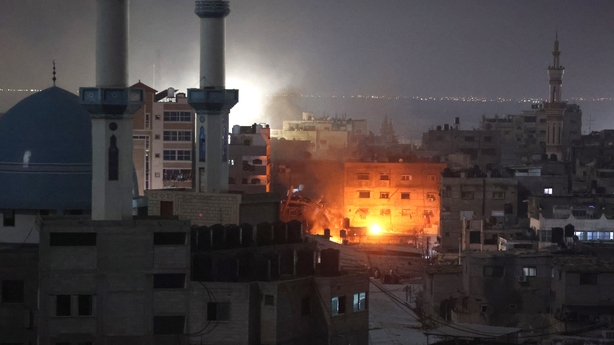
Talks have been held for weeks with the goal of reaching a temporary truce, to exchange Hamas' hostages for Palestinian prisoners held in Israeli jails, and to step up aid deliveries.
Mediators have voiced hope a deal can be reached before the start of Ramadan on 10 or 11 March, depending on the lunar calendar.
Jordan's King Abdullah II met with Palestinian president Mahmud Abbas and warned "of the continuation of the war on Gaza during the holy month of Ramadan, which will increase the threat of expanding the conflict", according to a royal statement.
Media reports suggest the warring parties are weighing a six-week halt to fighting and the initial exchange of dozens of female, underage and ill hostages for several hundred Palestinian detainees.
Hamas has so far also insisted on a full withdrawal of Israeli forces from Gaza, a demand Netanyahu has dismissed as "delusional".
'Desperation'
The Israeli military claimed that about "200 terror suspects" had been detained at Nasser Hospital in Khan Younis, saying its forces had "concluded" in recent days an operation around southern Gaza's main medical facility.
Gaza's health ministry previously said that troops had detained "a large number of medical staff, patients and displaced people".
The hospital was raided 10 days ago following days of fighting which left the complex in an "indescribable" state without electricity or running water, according to the World Health Organization.
Humanitarian aid was being delivered to the facility, the army claimed.
Israeli warnings of a Rafah ground invasion have sparked deep concern, and questions about where the Palestinians who have sought refuge there, many in makeshift camps, would flee to in the devastated territory.
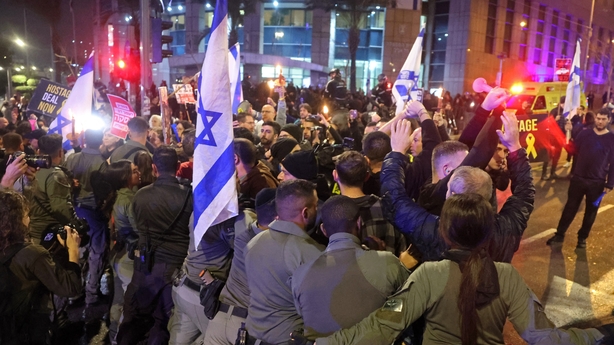
Neighbouring Egypt has kept its border closed to a mass refugee flight, arguing it will not help facilitate any Israeli operation to push Palestinians out of Gaza.
However, satellite images show it has also built a walled enclosure next to Gaza, in an apparent effort to brace for the arrival of large numbers of refugees.
Inside Israel, public pressure has grown on Netanyahu - both from the desperate families of hostages demanding swifter action, and from a resurgent anti-government protest movement.
Cross-border hostilities
Israel's defence minister Yoav Gallant said there would be no let-up in action against Lebanon's Hezbollah, whose militants have traded near-daily fire with Israeli forces since early October.
Both Hamas and Hezbollah are backed by Iran.
If diplomatic efforts fail to end the deadly cross-border hostilities, "we will do it by force", Gallant warned in a video message from a northern army base near Lebanon.
"If anyone thinks that when we reach a deal (with Hamas)... it will ease what is happening here - they are wrong."
